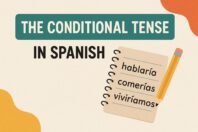Ago in Spanish: Using Hacer To Express Time

Get our free email course, Shortcut to Conversational.
Have conversations faster, understand people when they speak fast, and other tested tips to learn faster.
More infoWe could dedicate many blog posts to the verb hacer (to make or to do) due to its versatility, but in this post, we are going to focus on how it is used in relation to expressing time, or more specifically, ago in Spanish (e.g. 5 years ago).
First, let’s do a quick recap on the verb hacer, and how it is most commonly used.
The most common use is to express that we are doing or making something:
- I’m making a cake – Estoy haciendo una torta
- She is doing the homework – Ella está haciendo la tarea
It’s also used to talk about the weather:
- It was hot – Hacía calor
- It’s a beautiful day – Hace un día hermoso
You might have even noticed it being used in several Spanish idioms and phrases (which often do not have a specific translation in English).
- Keep a stiff upper lip – Hacer de tripas corazón
- To make it (career-wise) – Hacer carrera
In this post, we’ll mostly focus on the impersonal form of the verb to talk about a period of time.
- A long time ago, in a galaxy far far away – Hace mucho tiempo, en una galaxia muy muy lejana
- I’ve been waiting for you hours ago – He estado esperando por ti desde hace horas
Ago in Spanish: Using Hace To Express Time
As you know, hace is the third person form of the verb hacer in the simple present tense, but hace is also the impersonal form of the verb.
When we use hace to express time or “ago in Spanish”, we must include information about the amount of time we are talking about (e.g. 1 day, 5 months, 10 years).
Let’s see some examples:
1) To talk about an action in the past
Action in simple past + HACE + amount of time
- We got married 1 year ago – Nos casamos hace 1 año
- My father passed away 4 years ago – Mi padre murió hace 4 años
- I vaccinated my dogs 6 months ago – Yo vacuné a mis perros hace 6 meses
2) To talk about an action that started in the past and continues in the present
With this form, we start by giving the information with hace, and use the relative clause que as a connector for the action.
HACE + amount of time + QUE + action verb in present
- It’s been a year since we got married – Hace un año que estamos casados
- I’ve been sick for two days – Hace dos días que estoy enferma
- We are friends since 2 years ago – Hace 2 años que nos somos amigos
3) To talk about an action completed in the past (similar to the 1st example)
HACE + amount of time + Verb in past tense + complement
- 6 months ago we traveled to Spain – Hace 6 meses viajamos a España
- 2 years ago we were friends, but we don’t talk to each other anymore – Hace 2 años éramos amigos, pero ya no nos hablamos
- 3 years ago I quit that job – Hace 3 años renuncié a ese trabajo
4) When something has stopped happening, use Hasta Hace:
It’s common to use Hasta Hace if you want to describe the moment that something stopped happening in the past, for another action to take place.
HASTA HACE + Amount of Time + Action in past
Action in past + HASTA HACE + Amount of time + Complement
- Until 70 years ago, no woman in the world could vote – Hasta hace 70 años, ninguna mujer del mundo podía votar
- I worked until two hours ago, now I’m resting – Yo trabajé hasta hace dos horas, ahora estoy descansando
- Until two days ago I felt good. Now my body hurts – Hasta hace dos días me sentía bien. Ahora me duele todo el cuerpo
- The baby slept until 1 hour ago – El bebé durmió hasta hace 1 hora
5) Asking questions using Hace
Finally, at some stage, you’ll probably need to ask specific questions about the time an action had been executed in the past, or will be executed in the future.
You’ll notice that hace is often complemented with the prepositions desde (since) and hasta (until).
a) ¿Hace cuánto? (how long ago?)
To ask about the approximate time in which something has been happening.
- How long has it been since you quit smoking? – ¿Hace cuánto tiempo dejaste de fumar?
- How long have you had this car? – ¿Hace cuánto tiempo tienes este auto?
- How long have you lived in Argentina? – ¿Hace cuánto vives en Argentina?
b) ¿Desde hace cuánto? (since when?/how long?)
To ask about the exact moment that something started to happen.
- Since when have you been with a headache? – ¿Desde hace cuánto estás con dolor de cabeza?
- How long have you been in this job? – ¿Desde hace cuánto tiempo estás en este trabajo?
- How long have you been married? – ¿Desde hace cuánto están casados?
Before we finish, it’s important to mention that using the impersonal form of hacer to express time (or ago in Spanish) can occur not only in the present tense, but also in the imperfect and future tense.
1) Hacía is the impersonal form of hacer in the imperfect past tense, and is typically used to talk about something that was occurring in the past, before something else happened, or it was interrupted.
- I haven’t seen you in a long time before the party – Hacía demasiado tiempo que no te veía antes de la fiesta
- I was waiting for a response from the university for a long time, today a letter has arrived – Hacía tiempo que estaba esperando respuesta de la universidad, hoy llegó una carta
2) Hará is the impersonal form of hacer in the simple future tense, and is used to speak about an action being completed in the future (in addition to talking about the weather).
Although you can use this form to indicate how long the action has been taking place, it’s not as commonly used as “hace” and “hacía”.
In fact, you are more likely to find hará in literature, poems, and formal speeches, rather than hear it in daily conversations.
- Next month it will be 2 years since I graduated as a lawyer – El próximo mes hará 2 años que me gradué de abogado
- Tomorrow it will be about 15 days that I am waiting for a response from the bank – Mañana hará unos 15 días que estoy esperando respuesta del banco
- The day after tomorrow will be 4 days of dog surgery- Pasado mañana hará 4 días de la cirugía del perro
Ago in Spanish: Exercises
1) Fill in the blank space with the correct form of hacer.
a. ______ 10 años compré esta casa (10 years ago I bought this house)
b. ______ ______ 1 mes que duermo bien (I have been sleeping well for 1 month)
c. ______ que me mudé lejos de la ciudad soy más feliz (Since I moved away from the city I am happier)
d. _____ tiempo que no venìas a la ciudad (It’s been a while since you came to town)
2) Is this sentence correct or incorrect? Correct if necessary
a. Hasta hace dos días supe lo que sucedió (Until two days ago I knew what happened)
b. ¿Hace desde cuánto vives en Barcelona? (How long have you been living in Barcelona?)
c. Hace 10 años trabajo en esta oficina (I have been working in this office for 10 years)
d. Hace dos años desde nos conocimos (Two years ago we met)
Ago in Spanish: Answers
1) Fill the blank space with the correct time marker
- Hace 10 años compré esta casa
- Desde hace 1 mes que duermo bien
- Desde que me mudé lejos de la ciudad soy más feliz
- Hacía tiempo que no venìas a la ciudad
2) Correct or incorrect?
- Hasta hace dos días supe lo que sucedió
- ¿Hace cuánto vives en Barcelona?
- Hace 10 años trabajo en esta oficina
- Hace dos años que nos conocimos



